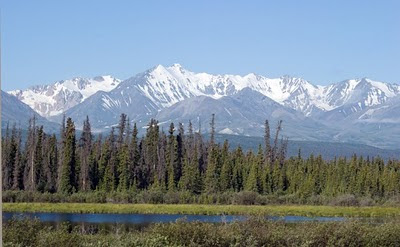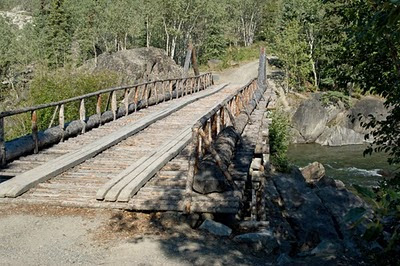Today was a semi-free day for our group. We had all day to do as we pleased but then had a group steak dinner at the camp ground in the evening.
Terry and I slept in...all the way until 7:30 AM! Then, after a breakfast of eggs and sausage links, I went and tried to wash the truck. One loonie (a dollar) would get me 3 minutes on the hose. I put in two and set it on wash. Hot soapy water under high pressure took a good deal of the tree pitch off and moved the dirt and grim to new locations on the truck. After I rinsed it the first time and let it dry a bit, I was unsatisfied so got a bucked and brush and deposited another loonie in the wash cycle. Filled the bucket and hosed the truck down again. When the three minutes were done, I "swept" down the truck as best I could and rinsed it off again. It wasn't perfect, but it was better than it was. As someone said who walked by as I was finishing, "You're sure to hit some rain before you get back to Pennsylvania."
After lunch, Terry and I went to town: the Visitors' Center, the SS Klondike, the Fish Ladder, and the McBride Museum of the Yukon.
The women working at the visitors' center were very helpful and we found some interesting information on Yukon activities there. One thing we've learned on this trip is that we should certainly stop at every visitors' center ASAP upon hitting any location that has one.
The SS Klondike is the last wooden paddleboat to ply the waters of the Yukon River between Whitehorse and Dawson City. She was retired from service in 1957 after carrying cargo between 1936 and 1952. Her final years were spent hauling tourists.
 The SS Klondike
The SS Klondike She'd haul 250 tons of cargo and, without a keel,
She'd haul 250 tons of cargo and, without a keel,
draw just 36 inches of water. Her boilers were fueled by cordwood.
Her boilers were fueled by cordwood.Cordwood would be stacked in two long rows, one on each side of the cargo hold. She might burn two cords and hour when fighting the current in some of the more difficult stretches.
 Mechanical liner.
Mechanical liner.This deck mounted device helped pull the vessel through the Five Finger Rapids by means of cables. The cables, sunk in the channel, would be fished out of the water and wound around the capstans. Then the ship could be more easily kept in the center of the narrow channel whether going up stream or down. It beat the heck out of having to have people on the shoreline hand-lining the boat through the narrows!
The ship is set up so as to reflect the way she might have looked in 1936. This included the menu in the dining room and the cargo down in the hold.
 Tins of gasoline. Packaged in 5 gallon containers,
Tins of gasoline. Packaged in 5 gallon containers,
two containers to a crate. Matches, shredded wheat and medicines.
Matches, shredded wheat and medicines.
 Canned fruits and vegetables.
Canned fruits and vegetables. Powdered milk (KLIM: "Spell it backwards") powdered eggs and sugar.
Powdered milk (KLIM: "Spell it backwards") powdered eggs and sugar. Bordens Reindeer Milk (Actually sweetened condensed milk.)
Bordens Reindeer Milk (Actually sweetened condensed milk.)After leaving the SS Klondike, we made our way over to The Fish Ladder below the hydro dam to see if the Chinook Salmon (also known as King Salmon) had arrived. No such luck. They've been delayed on their way up the Yukon, perhaps by the very heavy rains that washed out the road up north. We did learn that they expect them next week but that there won't be many of them. (A count done near the US-Canada border confirmed that the numbers are quite low.)
 A long, long swim!
A long, long swim!To reach Whitehorse, the Kings have to swim nearly 2000 miles up the Yukon River from the Bering Sea.
 The Fish Ladder
The Fish LadderThe ladder aids the fish in getting up the 60 feet necessary to rise above the power dam built by Yukon Energy. It's baffles, and pens made it easy for the fish to swim upstream to the lake above the dam and also easy for the scientists to capture, measure and--if necessary--strip eggs and milt from the fish.
This is the longest (1182 feet) wooden fish ladder in the world.
 Yukon Energy Dam
Yukon Energy DamThen it was back to the center of town to visit the MacBride Museum of the Yukon.
They had lots of interesting artifacts of the gold and silver and copper mining rushes that took place to the north. Including Sam McGee's original cabin.
 Sam McGee's cabin.
Sam McGee's cabin.Yes. He was a miner but he staked his claim in copper, not gold, and made a pretty penny on it, too. And no, he was not from Tennessee, but from Ontario and he claimed to have actually liked the cold, returning to the Dawson City area after a stint in California. And yes, he did know Robert W. Service, postal clerk, who liked the sound of his name so much he asked if he could use it in a poem.
 Canada's Red Ensign
Canada's Red EnsignThe Red Ensign was Canada's official flag until 1965 when she switched to today's red and white vertical stripes with the red maple leaf in the center. We saw one flying over the SS Klondike but didn't recognize it. Luckily, the museum explained it all.
 The Red Ensign explained.
The Red Ensign explained.As 5 PM approached we headed back to the campsite outside of town and enjoyed a nice steak dinner with our "family."
 "Captain" Hull commands the MV Schwatka
"Captain" Hull commands the MV Schwatka























































